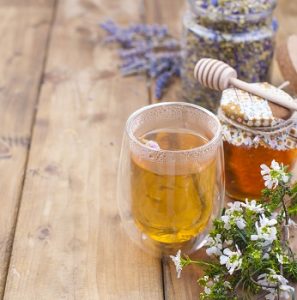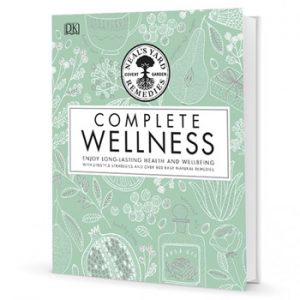
Use the power of plants to help you stay well this cold and flu season. [Photo: Bigstock]
Staying well – your respiratory system
11 October, 2018
By Staff Writer
Natural Health News
The essential act of breathing, which brings oxygen into the body, removes waste and carbon dioxide from the lungs, and plays a role in the smooth functioning of the nervous system.
But the healthy functioning of your lungs can be hampered by viruses, bacteria, and allergens. Targeted nutrients and holistic remedies help to protect and strengthen the respiratory system, optimizing respiratory function and enabling the body to resist infection effectively.
For any time of year, but especially as cold and flu season approaches, here are some great tips for supporting your respiratory system through nutrition, herbs, essential oils and lifestyle actions – taken from the new book Neal’s Yard Remedies Complete Wellness.
Food
Key nutrients can help to strengthen the respiratory system – building resilience, preventing the respiratory tract from succumbing to infection, and reducing irritation from allergens.
- Immune-enhancing garlic Garlic is potently antibacterial and antiviral, with decongestant and expectorant properties that can help to keep the lungs clear and ward off infection. Garlic also contains a substance called alliin, which when crushed turns into an unstable compound, allicin. In the body, allicin converts not the immune-boosting enzyme sulphur, which enhances the ability of white blood cells to fight viruses and germs. Raw garlic is most powerful, as heat destroys some of the sulphur compounds, so add raw garlic liberally to salad dressings.

Your guide to natural wellness from head to toe. See details below.
- Airway-calming citrus Citrus fruits contain immune-enhancing vitamin C and phytonutrient bioflavonoids, both of which have anti-inflammatory and anti-allergenic properties to help calm the airways. During pollen season and when colds are circulating, eat plenty of citrus fruits to reduce irritation to the airways and boost immunity – and, if you do succumb to a cold, help speed your recovery.
- Nutrient-dense mushrooms Mushrooms are a source of B vitamins, which are thought to boost disease-fighting white blood cells in the body, as well as the antioxidant selenium which, studies show, boosts the function of the immune system and also prevents free-radical damage to cells and tissues. Wild mushrooms, which are cultivated in the light, have increased levels of immune-enhancing vitamin D. Mushrooms also contain beta-glucans, a type of soluble fibre that supports disease-fighting white blood cells to boost immunity.
- Lung-supporting fatty acids Ocean plants such as seaweed contain a type of fatty acid known as polyhydroxylated fatty alcohols, or PFAs. PFAs have excellent anti-inflammatory properties that help to strengthen the lungs. PFAs are also found in avocados, one of the few land plants to contain PFAs.
- Sinus clearers Chilli peppers, hot mustard, curry, horseradish and wasabi, used to add a flavourful punch to foods, have the added benefit of helping to open the nasal passages to keep sinuses clear.
- Hydration boost Drinking plenty of water and herbal teas not only maintains hydration levels to support bodily functions overall, but also thins out mucus. As a bonus, good hydration can also help stop secretions in the nose and keep the soft palate from becoming stickier, and in this way it can help to prevent snoring.
- Protective antioxidants Matcha, finely powdered green tea leaves, is abundant in antioxidants to help reduce airway inflammation.
Herbs
Try herbs with a healing or soothing effect on the respiratory system and ones that support a well-functioning immune system enhance breathing.
- Natural antihistamines Nettles, as well as being a rich source of chlorophyll and iron, both of which support immunity, are also natural antihistamines, helping to calm over-sensitive airways and soothe inflamed tissues. Try harvesting fresh nettles – which grow abundantly in the wild – in spring for a soothing nettle infusion to help protect the airways against the onslaught of pollen. In the winter use dried herbs.
Quick tip for an immune boosting syrup…
Combi�ne 3–5ml echinacea tincture with 1–2 tsp elderberry syrup and drink daily as a preventative remedy.
- Protective berries Elderberries proved excellent support during the cold and flu season. Anti-inflammatory flavonoids in the berries help to keep airways healthy and functioning optimally, and studies show that taking elderberry syrup regularly can ward off respiratory infection thanks to the berries’ potent antiviral properties. If infection does take hold, a tea or tincture made from the flowers can soothe inflamed tissues and reduce catarrh and congestion. Do not eat raw elderberries as these can cause stomach upsets.
- Tissue-toning herbs If you’re susceptible to snoring, toning herbs, such as raspberry leaf, sage, and agrimony, can help to tighten and tone the tissues around the mouth and soft palate to ease breathing.
- Immune boosters If you feel a cold coming on, echinacea can help to shorten its duration by enhancing the immune response. Echinacea has been shown to boost the response of white blood cells to infection and reduce inflammation in the airways. Similarly, golden seal has a powerful anti-infective action and reduces inflammation in the airways to support respiratory function.
Essential oils
Inhaling essential oils or diffusing them into the environment can calm and clear the respiratory tract.
- Mucus-clearing oils Essential oils can make effective decongestants. Cedarwood and sandalwood break-up excessive catarrh and soothe the mucous membranes, while tea tree and bay laurel work as decongestants and are also highly antiseptic, helping to ward off germs.
Quick recipe to make a mucus loosening rub…
Add 5 drops tea tree essential oil to 10ml almond oi�l and massage into the upper back, chest and shoulders.
- Cooling peppermint Peppermint has a cooling effect that can be useful for calming fever if infection does take hold. It also has an expectorant action and can help to keep the sinuses clear during the winter months, helping to build resilience to germs in the respiratory tract.
- Throat-calming oils Antispasmodic essential oils such as helichrysum (immortelle) and thyme have a calming action that can help to prevent the occasional tickle in the throat from developing not a chronic cough.
- Lung-supporting oils Ravintsara is a warming oil that is both antiviral and antiseptic, offering protection against germs. It also has immunostimulant properties, which revive and support the immune system, boosting its resilience when defences may be lowered, for example, during times of stress. Frankincense oil, with its spicy, resinous aroma, also supports respiratory function, soothing the mucous membranes and relaxing and deepening breathing when needed.
Supplements
Supplementing the diet can be an effective way to reduce sensitivity to allergens and boost respiratory health during the winter cold and flu season, especially if you succumb fairly easily to infections.
- The essentials A daily high-quality multivitamin and mineral supplement tops up nutrients and provides insurance against specific deficiencies that can leave the respiratory system vulnerable to infection.
- Immune-supporting nutrients Vitamin C supports immunity, and its role in collagen syntheses – the structural protein n body tissues – makes it instrumental for tissue health, in turn supporting and promoting lung health. A zinc deficiency can increase susceptibility to germs. Studies show that zinc is anti-inflammatory and enhances immunity; taking a supplement at the start of a cold may reduce its severity and duration. Combine vitamin C and zinc for an immune boosting punch to help to fight off colds and sinus infections.
Quick recipe to make an effective sinus clearer…
Chop a thumb-sized piece of ginger �into a cup and pour over 250ml (9fl oz) boiling water, then leave to steep for 5 minutes before drinking. Add a little honey to taste, �if desired.
- Protective bioflavonoids When viruses are circulating, propolis – a sticky, resinous mixture of beeswax, saps, and other substances that bees produce – is a source of antiviral and immune-protecting bioflavonoids. Do not give bee products to young children, or take if you have an allergy to honey or bee stings, or you are pregnant or breastfeeding.
- Anti-inflammatory fats Essential fatty acid supplements have significant anti-inflammatory effects that can help protect against chronic coughs. Try eicosapentaenoic acid (EPA) fish oils or gamma-linolenic acid (GLA) from borage oil to ward off a persistent cough.
Taken from Neal’s Yard Remedies Complete Wellness, co-written by Natural Health News editor Pat Thomas, with Susan Curtis, Fran Johnson, Julie Wood and Fiona Waring (Dorling Kindersley, 2018) – a head to toe guide to self-care with targeted advice that allows you to tap into the restorative powers of plants and use tried and tested herbs, essential oils and nutritional remedies, healing recipes and lifestyle changes to treat a raft of common ailments.


